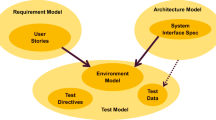Abstract
TTCN-3 is a new programming language, whichwas especially developed for testing. We analyzed how well the structure and the features of TTCN-3 conform to producing reusable test software. The analysis is mostly based on the conceptual model introduced in [1,2], the principles presented in [7,8,10] and our own understanding and experience of reusable software. Our conclusion is that TTCN-3 provides the basic language features for developing reusable test software. The modular structure of the language, its controlled and explicit interfaces promote reusability. Furthermore, the test specific characteristics of TTCN-3, which include its specific data types, expressions and test configurations, support reusability as well. When TTCN-3 is used in conformance testing of telecommunication protocols the reusability potential of TTCN-3 code is high. The more advanced reusability features that are required for object-oriented programming are not currently supported in TTCN-3.
Access this chapter
Tax calculation will be finalised at checkout
Purchases are for personal use only
Preview
Unable to display preview. Download preview PDF.
Similar content being viewed by others
References
Andreae, P., Biddle, R.L., Tempero, E.D.: How to reuse code, really: A guide to creating reusable code with C++. In: Proceedings of the 13th New Zealand Computer Society Conference, Auckland, New Zealand, New Zealand Computer Society, New Zealand (August 1993)
Biddle, R.L., Tempero, E.D.: Understanding the impacts of language features on reusability. In: 4th International conference on software reuse (ICSR 1996), Orlando, FL, USA, April 23 - 26, p. 9 (1996)
Ebner, M.: Mapping CORBA IDL to TTCN-3 based on IDL to TTCN-2 mappings, p. 14. University of Lübeck, Lübeck, Germany (2001)
ETSI ES 201 873-1 v.2.2.1. Methods for Testing and Specification (MTS); The Testing and Test Control Notation version 3; Part 1:TTCN-3 Core Language, p.148 (March 2003)
Grabowski, J.: TTCN-3 A new test specification language for black-box testing of distributed systems. In: 17th International Conference and Exposition on Testing Computer Software (TCS 2000), Washington D.C, June 2000, p.14 (2000)
Jacobson, I., Griss, M., Jonsson, P. (eds.): Software reuse. Architecture, Process and Organization for Business Success, p. 497. ACM Press, Addison-Wesley, New York, USA (1997)ISBN-0-201-92476-5
Kauba, E.: Software engineering process improvement through organized, methodical and controlled reuse of software and related assets. Final report V2.0, ESSI (European Systems and Software Initiative) programme 11, 26 (1997)
Karlsson, E.-A.: Software Reuse. A Holistic Approach. John Wiley & Sons, New York (1995)
Latvakoski, J.: Integration test automation of embedded communication software. Espoo: VTT Technical Research Centre of Finland, p. 88 (1997)
Myer, B.: Object-oriented software construction, 2nd edn., Santa Barbara, CA, USA ,Prentice Hall Professional Technical Reference (1997) ISBN-0-13-629155-4
Myer, B.: Genericity versus inheritance. In:Proceedings, Object-Oriented Programming Systems, Languages and Applications Conference, November 11. ACM SIGPLAN Notices, pp. 291–405 (1986)
Myers, G.J.: The art of software testing. John Wiley & Sons, Chichester (1979)
White, S.A., Lemus, C.: Architecture Reuse through a Domain Specific Language Generator position paper. In: Proceedings of WISR8: The eight annual workshop on Software Reuse, March 23-26,pp. White-S-A-1: White-S-A-6. Ohio State University (1997)
Author information
Authors and Affiliations
Editor information
Editors and Affiliations
Rights and permissions
Copyright information
© 2004 Springer-Verlag Berlin Heidelberg
About this paper
Cite this paper
Ruuska, P., Kärki, M. (2004). TTCN-3 Language Characteristics in Producing Reusable Test Software. In: Bosch, J., Krueger, C. (eds) Software Reuse: Methods, Techniques, and Tools. ICSR 2004. Lecture Notes in Computer Science, vol 3107. Springer, Berlin, Heidelberg. https://doi.org/10.1007/978-3-540-27799-6_5
Download citation
DOI: https://doi.org/10.1007/978-3-540-27799-6_5
Publisher Name: Springer, Berlin, Heidelberg
Print ISBN: 978-3-540-22335-1
Online ISBN: 978-3-540-27799-6
eBook Packages: Springer Book Archive




